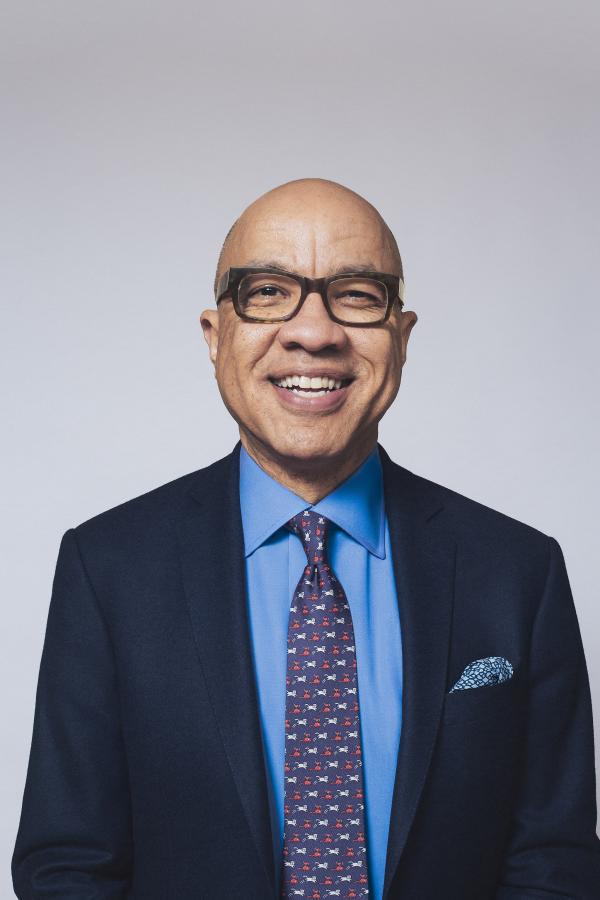Darren Walker
National Humanities Medal
2023

—Wikimedia

—Wikimedia
Darren Walker’s journey is a study in American resilience and aspiration. His rise from childhood poverty to success on Wall Street is a story about individual determination. But he was also helped along the way, for instance as a student in the inaugural Head Start class in 1965, demonstrating how the collective power of government can help clear pathways to success.
The transformational energies of the humanities were there from the start—be it in the borrowed books Walker devoured as a child, or in reading Macbeth aloud in a fourth-grade class.
“When I was confronted with something beautiful, I was absolutely fascinated,” he says. “I was always taken out of my place, right? Which wasn’t a great place. And the ability to imagine—which is what great literature does—can take you to another place.”
Walker’s quest to reshape American philanthropy has been the centerpiece of his career. His deepening involvement with charitable giving at the Rockefeller Center and the Ford Foundation led him to a startling realization: Philanthropy’s guiding principles and practices remained unaltered since Andrew Carnegie articulated them during the Gilded Age in his landmark essay, “The Gospel of Wealth.”
So when Walker became the Ford Foundation’s tenth president in 2013, he began to offer a bolder vision rooted in the work of Dr. Martin Luther King Jr., and informed by more than a century of pioneering work in the social sciences.
In his 2019 book, From Generosity to Justice: A New Gospel of Wealth, Walker insisted that charitable organizations grapple more directly with inequality, and move past amelioration to address injustice’s deep and stubborn roots in our society and culture.
“What I've tried to do is to influence discourse,” says Walker. “To move us from a framework of generosity and charity to one of dignity and justice.”
These efforts have created much more than a rhetorical turn. Walker has pushed writers and artists forcefully into the same cultural conversation about social justice he sparked within philanthropy. Walker’s tireless advocacy for bold individual voices and innovations in curation and investments have reshaped numerous larger institutions’ approach to the humanities.
“The work of philanthropy in part is to invest in ideas,” says Walker, including “ideas that may be marginal at one point in time.” But, “with the right level of investment, and the right leaders who have a vision and can articulate and inspire others, these ideas move from the margins to the mainstream.”
Philanthropic institutions are deeply interconnected with humanities organizations. Indeed, charitable giving has built enduring institutions and systems for the nation’s culture.
“The field of economics was supported and funded by foundations,” observes Walker. “So many schools of liberal arts and disciplines—whether it be sociology or a particular literature. Book awards and projects for journalism. Philanthropy played a foundational role in setting them up.”
Yet especially among younger philanthropists, trends in the work of giving have swung in a different direction—and Walker says the world of giving is adjusting to a new landscape: “Framing it as ‘the humanities’ is less important to them than ‘Where is innovation happening in our society? Who are the innovators?’ Young philanthropists are less institutionalists than my generation or older.”
The shift has placed more attention on the progress of science and technology, but Walker argues that philanthropy must maintain ample and continuing space for the experience of being human.
“What I worry about is that as we move into a more science-based, STEM-focused curriculum, . . . we lose the part of our educational system that helps develop empathy, and helps deepen our own humanity,” observes Walker. “We absolutely need physics and engineering and computational science. But to be educated in that without some humanities is not educating a full human being.”
Walker’s pivot from Wall Street to New York City’s nonprofit landscape thirty years ago opened the door to a role in creating substantive change on a global scale. Yet while he has received both France’s Commander of the Ordre des Arts et des Lettres, and United Kingdom’s Order of British Empire, he says he found his path by putting his talents to use in public service in Harlem.
“It was great to be able to take the skills I'd learned working in law, and at a bank, and in finance, and apply them to use with a social purpose—developing low-income housing, building economic development projects in a distressed community, and bringing the first supermarket to Harlem,” recalls Walker. “I knew that I had a calling that wasn’t making money or that wasn’t selling bonds to institutional clients.”
It is a calling certainly, which now will shape the National Gallery of Art as well, where Walker was recently elected the institution’s new president.
“What I've taken with me is how beauty in the form of literature or the visual arts or theater is a way to release yourself from whatever your situation may be,” he says. “I know this from my own lived experience, but I know it when I go to refugee camps, or to urban slums in India, or the favelas in Rio—and see young children reading literature, reading Shakespeare, reading James Baldwin, and reciting poetry. Seeing what it does to them. I know that. It’s what it did to me.”
—Richard Byrne